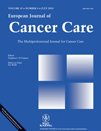Clinical features of oral chemotherapy: results of a longitudinal prospective study of breast and colorectal cancer patients receiving capecitabine in the UK
Abstract
BREARLEY S.G., CRAVEN O., SAUNDERS M., SWINDELL R. & MOLASSIOTIS A. (2010) European Journal of Cancer CareClinical features of oral chemotherapy: results of a longitudinal prospective study of breast and colorectal cancer patients receiving capecitabine in the UK
The aim was to describe the clinical sequelae of patients treated with capecitabine in terms of adverse events, treatment modifications and therapy cessation throughout the treatment trajectory. A total of 1232 toxicity assessments were undertaken on colorectal and breast cancer patients receiving palliative and adjuvant treatment prior to treatment and at days 7, 14 and 21 for six cycles of chemotherapy. Most common adverse events were diarrhoea, nausea, palmar-plantar erythrodysesthesia (PPE), fatigue and pain which were experienced by over 80% of subjects. Grades 2 and 3 adverse events were common (n= 916 and n= 113) but their development into grade 4 was uncommon (n= 2). There was a downward trend in the percentage incidence of toxicity; however, PPE increased. Almost 60% of subjects completed six cycles, or planned treatment. Some 40% of subjects commenced treatment on a dose reduction (<1250 mg/m2), and this increased to 70% at cycle 6. In total, 2.8–11.6% of subjects experienced toxicity-related treatment deferrals. While adverse events are common with capecitabine the lack of grade 4 adverse events support the efficacy of current clinical management strategies. The deferral and dose reduction data indicate that cycles 1 and 2 are important and require careful management and clinical interventions in order to prevent high-grade adverse events.




